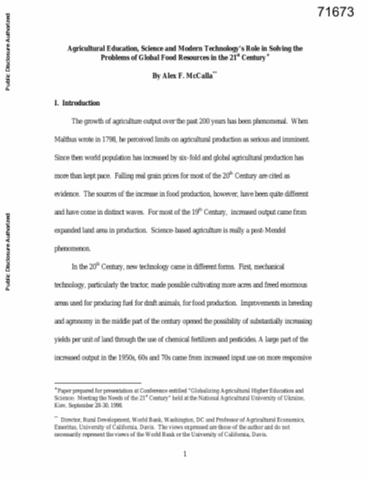Agricultural Education, Science and Modern Technology's Role in Solving the Problems of Global Food Resources in the 21st Century
The growth of agriculture output over the past 200 years has been phenomenal. When Malthus wrote in 1798, he perceived limits on agricultural production as serious and imminent. Since then world population has increased by six-fold and global agricultural production has more than kept pace. Falling real grain prices for most of the 20th Century are cited as evidence. The sources of the increase in food production, however, have been quite different and have come in distinct waves. For most of the 19th century, increased output came from expanded land area in production.
Irrigation water management and the Bundala National Park: Proceedings of the Workshop on Water Quality of the Bundala Lagoons, held at IIMI, in Colombo, Sri Lanka 03 April 1998
The main objectives of the workshop were to discuss current insights into the water quality of the Bundala Lagoons, to set priorities for further research, and develop appropriate water management strategies that could improve and sustain the environment of the Bundala Na- tional Park. The workshop brought together a multidisciplinary group of 38 people from 22 governmental and nongovernmental organizations.
China's past, present, and future food economy: can China continue to meet the challenges?
Salinity management alternatives for the Rechna Doab, Punjab, Pakistan. Volume 2 - History of irrigated agriculture
Rôle de la diversification a l'echelon des exploitations agricoles dans l'adoption de technologies modernes au Brésil
Pre-feasibility study on extension of small irrigation schemes in the North African Sub-region
Historically, water management has not been easy in the sub-region. Three climate interlinked factors have had a direct influence on it. The first is the aridity that affects all countries of the sub-region. It is impressing to think that about ninety percent of the area of the Maghrebine countries receive less than 100 mm rainfall per year that is poorly distributed. The second is the huge evaporation from open water reservoirs. For example, annual losses due to canal evaporation reach 2 cubic km in Egypt. Another factor is drought.
Mission report on SADC Sub-Regional Action Programme (SRAP) on Combating Deertification
The mission held discussions with several members of staff of the SADC-ELMS on current and planned programmes and activities of ELMS with emphasis on issues related to combating desertification and the mitigation of the impacts of drought. Amongst those interviewed in Maseru included the technical advisor, a training officer and environment officer of the ELMS and the UNDP Resident Representative. In Namibia and Botswana the interviews and discussions centered on possible institutions that could be entrusted with the responsibility of coordination of SRAP activities on behalf of SADC ELMS.
A 2020 Vision for food, agriculture, and the environment in Sub-Saharan Africa
The workshop participants were clear that now is the time for choices, and that without the will to make those choices, the likelihood of success in boosting agricultural growth on a sustained basis would be small. Without such growth, it will not be possible to improve food security or halt natural resource degradation. It seems unlikely that all countries of Africa will choose to put in place the necessary conditions for growth, which makes it all the more important to decide at the outset which conditions are most likely to beget further success.
Measuring the environmental impacts of economic changethe case of land degradation in Philippine agriculture
L'agriculture durable au Benin: constat, analyse et perspectives
Compte-rendu d'un séminaire sur les recherches pour le développement d'une agriculture durable au Bénin qui s'est tenu le 9 septembre 1993 à Amsterdam.










